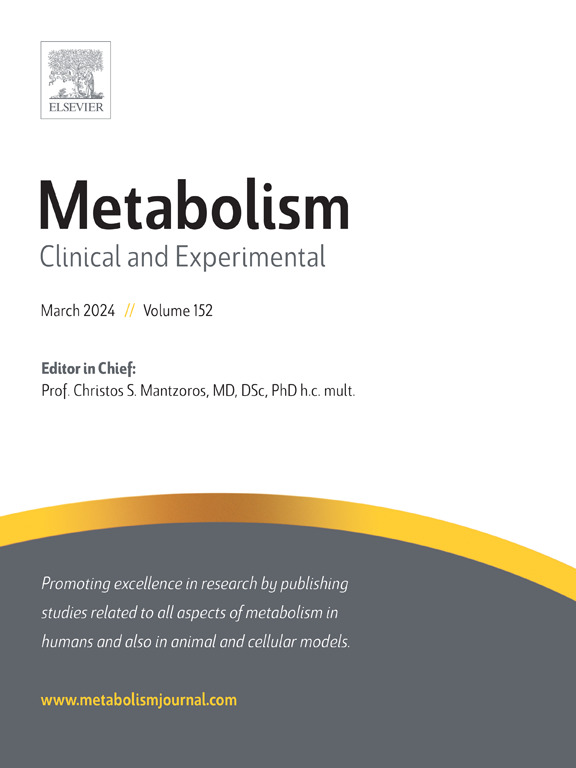抑制 ACSS2 会引发糖酵解抑制和核转运,从而激活 SIRT1/ATG5/ATG2B 去乙酰化轴,促进自噬,降低卵巢癌的恶性程度和化疗耐药性。
IF 10.8
1区 医学
Q1 ENDOCRINOLOGY & METABOLISM
引用次数: 0
摘要
背景:代谢重编程是癌症的一个特征,其特点是高度依赖糖酵解,并加强利用醋酸盐作为替代碳源。ACSS2 是乙酸代谢的关键调节因子,在各种恶性肿瘤的发生和发展过程中发挥着重要作用。ACSS2 促进乙酸酯向乙酰-CoA 的转化,乙酰-CoA 参与多种代谢途径,并充当蛋白质乙酰化的表观遗传调节因子,从而调节自噬等关键细胞过程。然而,ACSS2、糖酵解、蛋白质乙酰化和自噬在卵巢癌(OC)中的作用和内在联系仍有待阐明:利用临床标本和在线数据库,我们分析了ACSS2在卵巢癌中的表达及其与临床预后的关系。通过敲除 ACSS2,我们评估了其对恶性表型、醋酸代谢、糖酵解和自噬的影响。我们使用海马测定法、透射电子显微镜、膜电位测量和稳定同位素标记技术全面分析了OC细胞的代谢变化。利用CUT&TAG和共免疫沉淀技术探讨了ACSS2通过SIRT1介导的自噬相关蛋白的去乙酰化。此外,通过分子对接、转录组测序和代谢组学分析,我们验证了芍药酚对 ACSS2 和 OC 细胞糖酵解过程的药理作用。最后,我们进行了体外和体内实验,研究芍药酚对自噬的影响及其通过 ACSS2/SIRT1 去乙酰化轴介导的抗 OC 作用:主要发现:ACSS2在OC中明显上调,并与预后不良有关。敲除 ACSS2 可抑制 OC 细胞的增殖、迁移、侵袭、血管生成和铂类抗性,同时减轻体内肿瘤负荷。从机理上讲,抑制 ACSS2 可减少醋酸代谢,并通过靶向 HXK2 抑制糖酵解。糖酵解的减少促进 ACSS2 从细胞质转位到细胞核,导致去乙酰化酶 SIRT1 的表达增加。SIRT1 可介导 ATG5 和 ATG2B 等自噬相关蛋白的去乙酰化,从而显著激活 OC 细胞的自噬,发挥抗肿瘤作用。芍药酚通过靶向 ACSS2 抑制 OC 细胞的乙酸代谢和糖酵解。芍药酚通过ACSS2/SIRT1/ATG5/ATG2B去乙酰化轴激活自噬,对体外和体内的OC均有抑制作用:主要结论:Pae 可作为一种有效、低毒、多靶点的药物,靶向 ACSS2 和糖酵解。它通过 ACSS2/SIRT1/ATG5/ATG2B 去乙酰化信号级联激活自噬,从而发挥抗肿瘤作用。我们的研究为了解 OC 的恶性机制提供了新的视角,并为其治疗提供了新的策略。本文章由计算机程序翻译,如有差异,请以英文原文为准。

Inhibition of ACSS2 triggers glycolysis inhibition and nuclear translocation to activate SIRT1/ATG5/ATG2B deacetylation axis, promoting autophagy and reducing malignancy and chemoresistance in ovarian cancer
Background
Metabolic reprogramming is a hallmark of cancer, characterized by a high dependence on glycolysis and an enhanced utilization of acetate as an alternative carbon source. ACSS2 is a critical regulator of acetate metabolism, playing a significant role in the development and progression of various malignancies. ACSS2 facilitates the conversion of acetate to acetyl-CoA, which participates in multiple metabolic pathways and functions as an epigenetic regulator of protein acetylation, thereby modulating key cellular processes such as autophagy. However, the roles and intrinsic connections of ACSS2, glycolysis, protein acetylation, and autophagy in ovarian cancer (OC) remain to be elucidated.
Basic procedures
Utilizing clinical specimens and online databases, we analysed the expression of ACSS2 in OC and its relationship with clinical prognosis. By knocking down ACSS2, we evaluated its effects on the malignant phenotype, acetate metabolism, glycolysis, and autophagy. The metabolic alterations in OC cells were comprehensively analysed using Seahorse assays, transmission electron microscopy, membrane potential measurements, and stable-isotope labeling techniques. CUT&TAG and co-immunoprecipitation techniques were employed to explore the deacetylation of autophagy-related proteins mediated by ACSS2 via SIRT1. Additionally, through molecular docking, transcriptome sequencing, and metabolomics analyses, we validated the pharmacological effects of paeonol on ACSS2 and the glycolytic process in OC cells. Finally, both in vitro and in vivo experiments were performed to investigate the impact of paeonol on autophagy and its anti-OC effects mediated through the ACSS2/SIRT1 deacetylation axis.
Main findings
ACSS2 is significantly upregulated in OC and is associated with poor prognosis. Knockdown of ACSS2 inhibits OC cells proliferation, migration, invasion, angiogenesis, and platinum resistance, while reducing tumour burden in vivo. Mechanistically, inhibiting ACSS2 reduces acetate metabolism and suppresses glycolysis by targeting HXK2. This glycolytic reduction promotes the translocation of ACSS2 from the cytoplasm to the nucleus, leading to increased expression of the deacetylase SIRT1. SIRT1 mediates the deacetylation of autophagy-related proteins, such as ATG5 and ATG2B, thereby significantly activating autophagy in OC cells and exerting antitumor effects. Paeonol inhibits acetate metabolism and glycolysis in OC cells by targeting ACSS2. Paeonol activates autophagy through the ACSS2/SIRT1/ATG5/ATG2B deacetylation axis, demonstrating inhibition of OC in vitro and in vivo.
Principal conclusions
Pae can serve as an effective, low-toxicity, multi-targeted drug targeting ACSS2 and glycolysis. It activates autophagy through the ACSS2/SIRT1/ATG5/ATG2B deacetylation signalling cascade, thereby exerting anti-OC effects. Our study provides new insights into the malignant mechanisms of OC and offers a novel strategy for its treatment.
求助全文
通过发布文献求助,成功后即可免费获取论文全文。
去求助
来源期刊

Metabolism: clinical and experimental
医学-内分泌学与代谢
CiteScore
18.90
自引率
3.10%
发文量
310
审稿时长
16 days
期刊介绍:
Metabolism upholds research excellence by disseminating high-quality original research, reviews, editorials, and commentaries covering all facets of human metabolism.
Consideration for publication in Metabolism extends to studies in humans, animal, and cellular models, with a particular emphasis on work demonstrating strong translational potential.
The journal addresses a range of topics, including:
- Energy Expenditure and Obesity
- Metabolic Syndrome, Prediabetes, and Diabetes
- Nutrition, Exercise, and the Environment
- Genetics and Genomics, Proteomics, and Metabolomics
- Carbohydrate, Lipid, and Protein Metabolism
- Endocrinology and Hypertension
- Mineral and Bone Metabolism
- Cardiovascular Diseases and Malignancies
- Inflammation in metabolism and immunometabolism
 求助内容:
求助内容: 应助结果提醒方式:
应助结果提醒方式:


